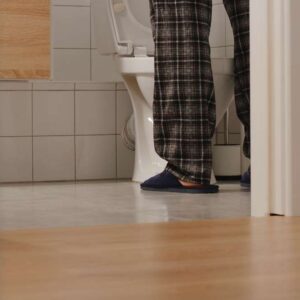
Doctors Are Taking Your Blood Pressure WRONG—Here's Why
I get frustrated every time I go to the doctor (yes, doctors do go to the doctor) because the people who take my blood pressure almost always do it incorrectly.
And before you think I’m just being a cranky know-it-all, let me explain why this matters…
How many times have you rushed into the doctor’s office, gotten hustled into a chair, and had someone slap a cuff on your arm while you’re still catching your breath? They pump it up, scribble down some numbers, and move on to the next patient.
Sound familiar? Well, it turns out there’s a far better way to get an accurate reading—and it’s so simple, you’ll wonder why everyone hasn’t been doing it all along.
A new study from UT Southwestern Medical Center found that measuring blood pressure while patients are standing rather than sitting may actually improve the accuracy of readings.
Their findings, published in Scientific Reports, could lead to significant improvements in the early detection of high blood pressure in healthy adults. And trust me, early detection is everything when it comes to this silent killer.
High blood pressure is the number one risk factor for heart disease and stroke, affecting a whopping 48 percent of adults in the United States!
That means nearly half of us are walking around with a ticking time bomb in our arteries.
Researchers discovered that standing blood pressure readings caught cases of hypertension that the traditional sitting method missed entirely.
Think about it—you spend a significant amount of your day standing and moving around. And we’re certainly more active in our daily life than when we’re planted in a chair at the doctor’s office getting our blood pressure taken.
So, it makes sense to measure our blood pressure in a position that actually reflects how we live our lives.
This isn’t just academic nitpicking—it could mean the difference between catching high blood pressure early enough to do something about it or missing it, resulting in serious complications down the road.
Now, I’m not saying you should march into your next appointment and demand they take your blood pressure standing up (though honestly, it couldn’t hurt to ask). But this research does highlight something I’ve been saying for years: how we measure things in medicine matters just as much as what we’re measuring.
The current standard practice—having you sit in a chair with your feet on the floor, arm supported at heart level, after resting for five minutes—isn’t necessarily wrong. But it might not be the whole picture.
Standing blood pressure measurements could be vital for seniors who might have different cardiovascular responses when standing versus being seated.
As we age, our blood vessels become less flexible, and our bodies might not regulate blood pressure as efficiently when we change positions. A standing measurement could reveal problems that a sitting measurement misses.
The bottom line is, if we’re going to rely on blood pressure readings to make important decisions about our health, we’d better make sure we’re getting accurate numbers.
Written By Dr. Scott Olson, ND
Nearly 25 years ago, failed mainstream medical treatments left Dr. Olson in constant pain – and his health in ruins. And that’s when he did something REVOLUTIONARY. He began his career in medicine – and dedicated his life to uncovering the true, underlying causes of disease.
Through his innovative medical practices in Tennessee and Colorado, Dr. Olson has helped cure countless seniors from across America of arthritis… heart disease… diabetes… and even cancer. All without risky prescription drugs or painful surgeries.
View More Free Articles
Mailbag: End Midnight Bathroom Runs with These 6 Natural Fixes
“Thank you for your Living Well Daily newsletter! Can you please share any thoughts on how to support prostate health? Especially getting up and going to the bathroom twice a night. The stream is not as strong as it once was; it takes longer to empty. Thanks!” —Night Shift Hi Shift, Thank you for being...
Coffee Flips Your “Longevity Switch?”
The rich aroma fills your kitchen, steam rises from the top as you pour, and as you wrap your hands around the mug to take a sip, it gently warms your hands. Then comes that moment when the caffeine kicks in—suddenly, the world snaps into focus. If you’re like me, the day doesn’t officially begin...
Build a “Memory Savings Account” with This Daily Habit
Remember when you used to make fun of your parents for not remembering things—like the name of an actor? Well, joke’s on us. Now we’re the ones googling names mid-conversation because we can’t remember if he was in that Christmas movie “where things blow up,” or the other one “where the ship sank.” But before...
The Brain Secret That DEFIES Aging
We’ve all heard the bad news when it comes to brain aging—shrinking volume, fading memory, slower reaction times. But new research from the German Center for Neurodegenerative Diseases (DZNE) delivers an unexpected—and uplifting—twist. Parts of your brain don’t just resist the aging process… they can actually get stronger. Let’s take a closer look… In a...
The Simple Secret to Better Health (No Gym Membership Required)
Let’s be honest—fitness culture is downright exhausting. You’ve probably encountered those ultra-dedicated exercise enthusiasts who turn every conversation into a masterclass on extreme workouts. They’re the ones posting their 5 AM CrossFit sessions and talking about their latest “beast mode” routine. And hey, good for them! But here’s the thing—you don’t need to become a...
Could This Gut Bug Outperform Ozempic?
Unless you’ve been living under a rock you’ve likely heard of Ozempic and similar GLP-1 drugs. They’ve been making headlines for their ability to help with blood sugar control—and, in many cases, weight loss. If you’re overweight or diabetic you may have even considered taking a GLP-1. But these drugs aren’t perfect. They can be...
Mailbag: 5 Tips to Dodge the Fall COVID Spike
“COVID is spreading through my family like wildfire. We’re thinking it’s the latest variant. Are there any new recommendations for protecting yourself against it? My spouse and I have tested negative so far, but we want do everything we can to dodge it this time around.” –Dodging Variants Hi Dodging, The “Nimbus” variant (NB.1.8.1) has...
Childhood Pastime “Rewires” the Parkinson’s Brain?
If you or someone you love is living with Parkinson’s disease, you know how relentless it can be. The stiffness. The tremors. The way even small, everyday tasks—buttoning a shirt, pouring a cup of coffee—can feel like a battle. It’s more than just the physical symptoms, too. Parkinson’s changes the way the brain communicates with...
The Sweet Deception Raising Your Diabetes Risk
You’ve probably seen the commercials… A trim person cracks open a can of diet soda and smiles about the healthy choice they’ve made. After all, no sugar, no calories—what’s not to like? But according to a new study, that seemingly “smart” swap might be quietly sabotaging your health. Researchers from Australia and the Netherlands have...
The Dirty Truth Lurking in Your Laundry Basket
If you’ve ever peeled off a pair of socks after a long summer day and caught a whiff of something foul… you’re not imagining things. That smell? It’s not just sweat. It’s the result of a full-blown microbial party happening between your toes. And for seniors—especially those with diabetes or compromised immune systems—this isn’t just...









